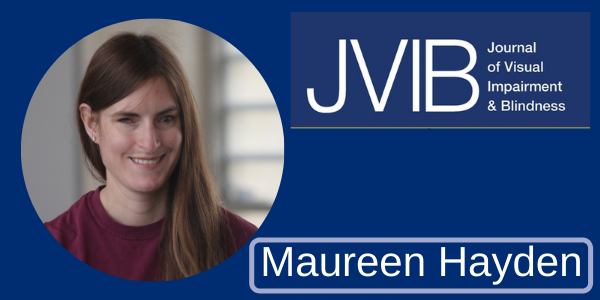When asked, "Were you nervous the first time you had to use a Bunsen burner with an open flame during microbiology lab?" Maureen J. Hayden, a blind woman who is pursuing a doctoral degree in marine biology at Texas A&M University, replied, "Of course!"
This exchange begins a commentary featured in the recent Special Issue on Transition to a Meaningful Adult Life for Individuals With Visual Impairments of the Journal of Visual Impairment & Blindness (JVIB), in which Ms. Hayden describes her experiences as a mentee and, later, as a mentor to students who are pursuing careers in science, technology, engineering, and mathematics (STEM). In her writing, she demonstrates "the value of these roles in the professional successes and personal growth of people who are blind."
Like other youngsters who are blind, Ms. Hayden tried to avoid using access technologies or tools that would make her "stand out in a crowd." She writes, "I struggled with my identity as a blind person all throughout my K-12 education. As a youth, I wanted to be 'normal' or like my peers."
When she moved away from her hometown and began college, she talks about a change in mindset: "I had my first opportunity to redefine how others saw my disability and how I related to my blindness. . . . The young girl who used to avoid anything that would differentiate her from her peers started to learn to embrace the tools and technologies that would help her achieve her goals."
This change in attitude about the value of access technology is one of the many things she conveys to the students she mentors now: "Communicating with other individuals who are blind or low vision, as well as other individuals who are sighted with similar interests, can help youths and young adults learn about and embrace tools, technologies, and other aspects of blind culture they may not have known about otherwise."
Ms. Hayden's story encourages students with visual impairments to continue the hard work of pursuing careers in STEM areas, it gives teachers and other professionals additional ways to convince these students to embrace access technology by thinking of the doors it will open for them, it demonstrates for parents and caregivers that the diagnosis of visual impairment does not preclude their child from attending college and STEM careers, and it encourages professionals who are blind or have low vision to find the time to serve as a mentor to a student who will benefit from their advice and lived experiences.
To learn more about Ms. Hayden's academic journey, the mentors who advised her along the way, and her current work with mentees, read "The Importance of Mentorship When Pursuing a STEM Career as a Person With a Visual Impairment," a featured commentary that was included in the recent Special Issue on Transition to a Meaningful Adult Life for Individuals With Visual Impairments of the Journal of Visual Impairment & Blindness (JVIB). Ms. Hayden's commentary will be free for all to read on the Sage Publishing website for a limited time.
The Journal of Visual Impairment & Blindness is the essential professional resource for information about blindness and low vision. The international peer-reviewed journal of record in the field of visual impairment, it delivers current research and best practice information, as well as commentary from experts on critical topics, news, and events. This journal is a member of the Committee on Publication Ethics (COPE).
Publisher of the Journal of Visual Impairment & Blindness for over a century and counting, the American Foundation for the Blind is also proud to have launched mentorship programs that expand pathways to leadership, inclusive technology, and well-paying career opportunities for people who are blind. These include the AFB Blind Leaders Development Program, and the AFB Talent Lab, which is now accepting applications for paid internships and apprenticeships.
